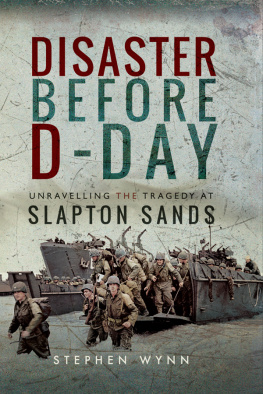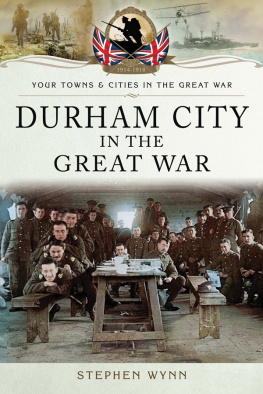
A shell up-rooted a tree, which pinned three or four of my comrades to the bottom of the trench. Before any of us could get to their assistance a second shell burst, completely burying the unfortunate men in mud. Any attempt to extricate them was hopeless and they died a dreadful death.
Private Horace Le Breton March 1915
First published in Great Britain in 2016 by
PEN & SWORD MILITARY
an imprint of
Pen and Sword Books Ltd
47 Church Street
Barnsley
South Yorkshire S70 2AS
Copyright Stephen Wynn, 2016
ISBN 978 1 47383 364 7
The right of Stephen Wynn to be identified as the author of this work has been asserted by him in accordance with the Copyright, Designs and Patents Act 1988.
A CIP record for this book is available from the British Library
All rights reserved. No part of this book may be reproduced or transmitted in any form or by any means, electronic or mechanical including photocopying, recording or by any information storage and retrieval system, without permission from the Publisher in writing.
Printed and bound in England
by CPI Group (UK) Ltd, Croydon, CR0 4YY
Typeset in Times New Roman by Chic Graphics
Pen & Sword Books Ltd incorporates the imprints of
Pen & Sword Archaeology, Atlas, Aviation, Battleground, Discovery, Family History, History, Maritime, Military, Naval, Politics, Railways, Select, Social History, Transport, True Crime, Claymore Press, Frontline Books, Leo Cooper, Praetorian Press, Remember When, Seaforth Publishing and Wharncliffe.
For a complete list of Pen and Sword titles please contact
Pen and Sword Books Limited
47 Church Street, Barnsley, South Yorkshire, S70 2AS, England
E-mail:
Website: www.pen-and-sword.co.uk
About the Author
Stephen is a happily retired police officer having served with Essex Police as a constable for thirty years between 1983 and 2013. He is married to Tanya. His two sons, Luke and Ross, were members of the armed forces, collectively having served five tours of Afghanistan between 2008 and 2013. Both of them were injured on their first tours which led to the publication of his first book; Two Sons in a Warzone Afghanistan: The True Story of a Fathers Conflict, which was published in October 2010 by Clairview Books. His teenage daughter, Aimee, is still at school. Both of his grandfathers survived the First World War, one with the Royal Irish Rifles, the other in the Mercantile Navy.
Stephen co-wrote a book published in August 2012, entitled German POW Camp 266 Langdon Hills (UKUnpublished Ltd) and has co-written three crime thrillers which were published between 2010 and 2012. He has also written other books for Pen & Sword Books, many of which are part of the Towns and Cities collection, which commemorate the sacrifices made by young men during the First World War.
Acknowledgements
Researching a book of this nature would not have been possible without the assistance of certain individuals and organisations. I would like to express my appreciation to the following: Andrew Pratley, for his research on Kent men who served in the Australian Army; Susan Featherstone and Susan Schibli for their photographs of Tunbridge Wells-related monuments; St Matthews Church for the photograph of the Memorial Tablet to those lost on HMS Hythe; St Johns Church for the photograph of their Roll of Honour. I would also like to thank my wife Tanya, for her continued support, help and consideration.
Every effort has been made to identify and acknowledge the copyright holders of the photographs and documents that have been used.
Prologue
Pre-War Tunbridge Wells
Tunbridge Wells, given the prefix Royal by King Edward Vll in 1909 dates back to Roman times. In 1606, Dudley, 3rd Baron North, discovered the chalybeate spring waters at The Pantiles which would ultimately make both him and the town famous. The town grew in popularity mainly due to the wells. People were drawn to the area to wonder at the claimed medicinal qualities of the spas waters. Everybody came, including members of the Royal Family. With such distinguished patronage it was decided that the town needed a church, so the Church of King Charles the Martyr was built in 1676, becoming the first permanent brick built structure in the town. Services at the Church were reliant on visiting ministers until 1709.
Grove Road, Tunbridge Wells. Pre-war photograph. (Unknown photographer)
Soldiers marching through Tunbridge Wells. (Unknown photographer)
Around 1750 Dr Richard Russell wrote a paper on the benefits of bathing in and drinking sea water as a possible cure for enlarged lymphatic glands. Then, in the early 1830s, the Church was visited by Princess Victoria and her mother, the Duchess of Kent. By now the town was the place to be for the more well off members of society and not just for a holiday or daytrip; they were making Tunbridge Wells their home.
In 1842 a new bus service meant the town could be reached from London within two hours. Three years later the railway followed, making it an even more accessible location. The towns affluence and population kept on growing and in 1889 Tunbridge Wells became a Borough.
During the First World War Tunbridge Wells had a significant military presence which continued throughout the war, with numerous regiments stationed in the town before going off to fight on the Western Front.
Tunbridge Wells would pay a high price in the number of its own young men that it lost during the war. Out of the nearly 3,000 who went off to fight, 801 would never return.
During the early years of the twentieth century, it was only the more affluent members of society who had the opportunity or money to go away on holiday to any destination, let alone one in a foreign country. On Saturday 1 August 1914, just three days before the outbreak of the First World War, Dr Claude Wilson, of Church Road, Tunbridge Wells, along with his wife and a female friend of theirs, found themselves in Lucerne, Switzerland.
Although the possibility of war had been hanging in the air for weeks, people were still holidaying in locations all over Europe as if oblivious to the potential danger they were in. Dr Wilson thankfully was not such an individual. He acquired train tickets to take them from Lucerne to Basle, with the intention of travelling on to Boulogne, which would have resulted in their arriving in Folkestone the same evening. The train arrived in Basle on time but that was when their problems began. Even though Britain had yet to declare war on Germany, and would not do so for another three days, the German army was already making its way through Belgium to get to France. Having arrived in Basle, Dr Wilson discovered that both the French and German borders were closed, which blocked his route to the Channel ports.




















